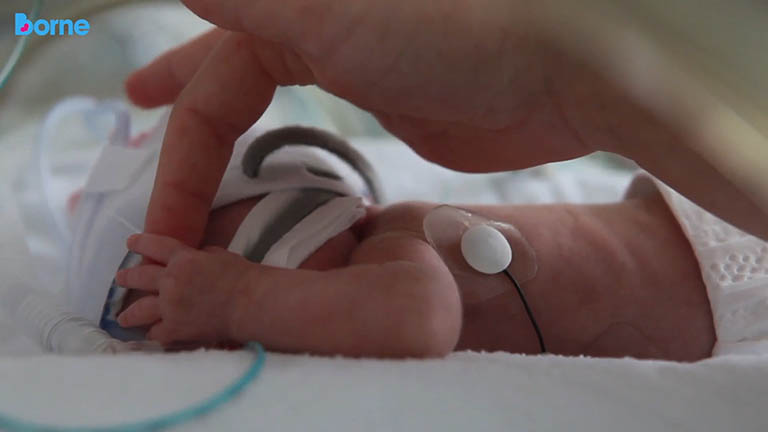Borne HMRI collaboration to advance pre-term pregnancy research
Having endured the grief of losing two children, former Wallabies player Dean Mumm and wife Sarah are linking with the Borne Foundation and Hunter Medical Research Institute (HMRI) to raise funds and awareness for research into premature birth.
“Premature birth is extremely close to my family’s heart after we lost Sophie and Henry,” Dean says. “You would do anything to avoid having a little baby placed into an incubator.”
In Dean’s case, that includes undertaking a North Pole expedition early next month.
The collaboration between Borne, a UK-based medical research group, and HMRI’s Pregnancy and Reproduction program, will unite world-leading pregnancy researchers in the quest to identify the causes of premature birth.
Each year in Australia around 30,000 babies – 9 per cent of all pregnancies – are born pre-term, with a mean gestational age of 33 weeks. Many pre-term babies face an early battle for survival, jeopardising the child’s future life, educational attainments, and the risk of developing chronic disease.
Globally, 85 per cent of women who present with preterm labour are unanticipated.

“The welfare of our children is very dependent upon the time and weight at which they’re born,” senior HMRI researcher Laureate Professor Roger Smith AM explains. “Tragically, premature birth can also lead to the baby’s death in some cases. Yet we don’t understand the factors that determine the length of pregnancy nor how that clock mechanism links to the onset of labour.”
Laureate Professor Smith believes the Borne HMRI Collaboration will offer opportunities for researchers to link rather than working in isolation. Dean and Sarah Mumm aim to fund a multi-year research fellowship at HMRI.
Sarah first fell pregnant in 2012, shortly before the couple moved to England.
“Two days after my 20-week scan I had some stomach cramps and bleeding,” Sarah recalls. “Obviously I went into state of panic. Our little girl, Sophie, was delivered but she hadn’t survived ... you actually feel your heart break when it happens.”
Their second pregnancy began 10 months later and, despite precautions, Sarah again went into premature labour. Henry was born at 28 weeks and rushed into neonatal intensive care. “On day 9 they let us hold Henry because his heart was failing. He died shortly afterwards from infection,” Sarah says.
The Mumms now live in Sydney with two-year-old Alfie.
Borne founder and chief scientific officer Professor Mark Johnson, who assisted Sarah and Dean with their third pregnancy, believes that new treatments and preventatives will result from a better understanding of the causes.
“I hope that one day all women will be screened for their risk of pre-term birth, so we can watch them very carefully and reduce that risk – maybe prevent it altogether,” he says.
Dean is now in England to finalise his preparations for the North Pole trek, aiming to personally raise over $100,000. The team will face their own survival test in icy temperatures of -25C and -45C.
Upon arriving in Longyearbyen, Norway, on April 5, his focus will turn to cross-country skiing before starting the 100km Arctic journey from a Russian research station. “We hope to finish in about four or five days, so 20-25 kilometres a day, with a 40kg sled behind us,” Dean says.
For details or donations, please see hmri.org.au/borne
Laureate Professor Roger Smith, from the University of Newcastle and Hunter New England Health, is Director of the University of Newcastle’s Mothers and Babies Research Centre and co-director of the HMRI Pregnancy and Reproduction Research Program. HMRI is a partnership between the University of Newcastle, Hunter New England Health and the community
Related news
- Launch of the School Students’ Statement on the Right to a Healthy Environment
- Funding boost to technology for lower emission steel
- Newcastle team on mission to improve childhood cancer outcomes
- Shanae’s passion for caring delivers her dream to work in health
- Food and nutrition degree serves Keren a rewarding career
The University of Newcastle acknowledges the traditional custodians of the lands within our footprint areas: Awabakal, Darkinjung, Biripai, Worimi, Wonnarua, and Eora Nations. We also pay respect to the wisdom of our Elders past and present.